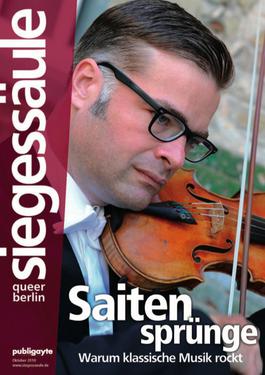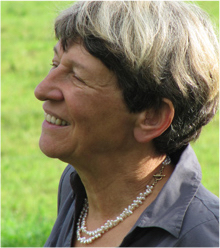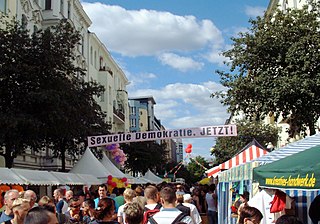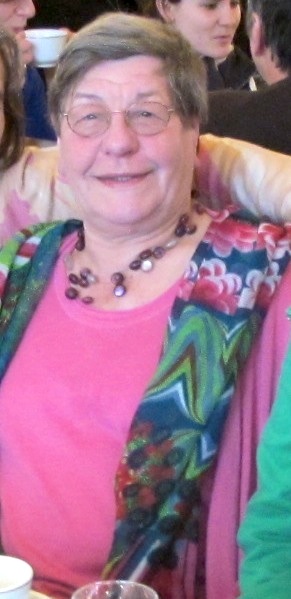
Barbara Jean Hammer was an American feminist film director, producer, writer, and cinematographer. She is known for being one of the pioneers of the lesbian film genre, and her career spanned over 50 years. Hammer is known for having created experimental films dealing with women's issues such as gender roles, lesbian relationships, coping with aging, and family life. She resided in New York City and Kerhonkson, New York, and taught each summer at the European Graduate School.
Gisela Bock is a German historian. She studied in Freiburg, Berlin, Paris and Rome. She took her doctorate at the Free University Berlin in 1971 and her Habilitation at Technische Universität Berlin in 1984. She has taught at the Free University Berlin (1971–1983) and was professor at the European University Institute (1985–1989) in Florence, Italy, at the University of Bielefeld (1989–1997) and then at the Free University Berlin. She retired in 2007.
Women's music is a type of music based on the ideas of feminist separatism and lesbian-separatism, designed to inspire feminist consciousness, chiefly in Western popular music, to promote music "by women, for women, and about women".
The Deadly Nightshade is a New England–based rock and country trio consisting of members Anne Bowen, Pamela Brandt, and Helen Hooke, who originally began performing under the name Ariel in 1967, along with Gretchen Pfeifer and Beverly Rodgers. It was one of the earliest all-women rock bands signed to a major label, and an early women's music group. Some early members of the group originally performed as the Moppets.

Siegessäule is Berlin's most widely distributed queer magazine and has been published monthly, except for two brief hiatuses, since April 1984. Originally only available in West Berlin, it ran with the subtitle "Berlin's monthly page for Gays". In 1996, it was broadened to include lesbian content, and in 2005 it was expanded to reach a wider queer target base, becoming the only magazine of its scale in Europe to represent the full spectrum of the LGBT community. The magazine is available for free at around 700 locations in Berlin, printing 53.688 copies per month. Since March-issue 2013, it has been overseen by chief editor Jan Noll.

The Schwules Museum in Berlin, Germany, is a museum and research centre with collections focusing on LGBTQ+ history and culture. It opened in 1985 and it was the first museum in the world dedicated to gay history.

Not Bad for a Girl is a documentary on women musicians of the 1990s from the indie rock music genre grunge and riot grrrl and celebrates madness, creativity, and gender play. It was written, directed, produced and shot by rock phenomenologist feminist Lisa Rose Apramian, edited, shot and co-produced by drummer Kyle C. Kyle and co-produced by Courtney Love and Kurt Cobain. A DVD, with a booklet, was available for purchase at the official website and a release date for the sequel book is still in the works as of 2019.

Manuela Kay is a German journalist, author and publisher.

Cristina Perincioli is a Swiss film director, writer, multimedia producer and webauthor. She moved to Berlin in 1968. Since 2003 she lives in Brandenburg.

Cäcilia (Cillie) Rentmeister is a German art historian, culture scientist and researcher of cultural conditions of women and of gender. In addition to studying the different realities in which men and women are living, she has concerned herself with the matriarchy.
Suman Sridhar is a singer, songwriter, and actor. Sridhar works in music, performance art, theatre and film. Suman is trained in Bharat Natyam classical dance and Indian Classical music and studied Western Classical Music, Women's & Gender Studies and Visual Arts from Mason Gross Rutgers University, USA. Suman has sung chart topping Bollywood film songs. Her performances include venues like National Centre for the Performing Arts (India), Southbank Centre (UK), BBC- World Service (UK), MTV India, Sound Trek, NH7 Weekender (India), Radio Mirchi Music Awards (India), Mijwan Fashion Show (India), Jazzmandu (Nepal), Galle Literary Festival, The Quarter: Royal Opera House (India), The Great Escape Festival (UK), One Billion Rising (India) etc.

Theodora "Theo" Anna Sprüngli, better known under the pseudonym Anna Rüling, was a German journalist whose speech in 1904 was the first political speech to address the problems faced by lesbians. One of the first modern women to come out as homosexual, she has been described as "the first known lesbian activist".

Berlin was the capital city of the German Empire from 1871 to 1945, its eastern part the de facto capital of East Germany from 1949 to 1990, and has been the capital of the unified Federal Republic of Germany since June, 1991. The city has an active LGBTQ community with a long history. Berlin has many LGBTIQ+ friendly districts, though the borough of Schöneberg is widely viewed both locally and by visitors as Berlin's gayborhood. Particularly the boroughs North-West near Nollendorfplatz identifies as Berlin's "Regenbogenkiez", with a certain concentration of gay bars near and along Motzstraße and Fuggerstraße. Many of the decisive events of what has become known as Germany's second LGBT movement take place in the West Berlin boroughs of Charlottenburg, Schöneberg, and Kreuzberg beginning in 1971 with the formation of the Homosexuelle Aktion Westberlin (HAW). Whereas in East Berlin the district of Prenzlauer Berg became synonymous with the East Germany LGBT movement beginning in 1973 with the founding of the HIB. Schöneberg's gayborhood has a lot to offer for locals and tourists alike, and caters to, and is particularly popular with gay men.
Vibeke Vasbo is a Danish writer and women's rights and LGBT rights activist. In the early 1970s, she participated in the Redstocking movement and in the Danish Lesbian Movement. She embarked on a literary career in 1976 with Al den løgn om kvinders svaghed expanding on the work of a woman crane driver, based on her experiences in Oslo in 1974-75.
The Lesbian Movement was a Danish organization for lesbians established in 1974 in Copenhagen by a group of women including Vibeke Vasbo who were unhappy about the degree of intolerance towards lesbians in the Danish Redstocking Movement.

Ilse Kokula is a German sociologist, educator, author and lesbian activist in the field of lesbian life. She was awarded the Order of Merit of the Federal Republic of Germany.

Maria Rentmeister was a German Women's and cultural policy maker - who became an anti-government resistance activist after 1933. She spent much of the time during the twelve Nazi years abroad or, later, in state detention. In 1945 she relocated to what now became the Soviet occupation zone where she became the first General Secretary of the politically important Democratic Women's League .

The Eldorado was the name of multiple nightclubs and performance venues in Berlin before the Nazi era and World War II. The name of the cabaret Eldorado has become an integral part of the popular iconography of the Weimar Republic. Two of the five locations the club occupied in its history are known to have catered to a gay crowd, although attendees would have included not only gay, lesbian, and bisexual patrons but also those identifying as heterosexual.
Ursula Sillge is a German sociologist and LGBT activist. She organized the first national lesbian gathering in East Germany, and between 1970 and 1990 was one of the main lesbian activists in the country, pressing authorities to recognize the rights and allow visibility of the LGBT community. In 1986, she founded the Sunday Club in Berlin. It was the only secular association representing homosexuals in the 1980s, though it was not officially recognized. The organization became the first legal association to represent the LGBT community in East Germany when it was allowed to register in 1990. Sillge resigned as director of the Sunday Club in 1991 to found the LGBT archive known as the Lila Women's Archives. After the fall of the Berlin Wall, she was able to earn her doctorate. In addition to running the archives, she has published several works about homosexuality and women behind the Iron Curtain.
Vienna, the capital of Austria, has an active LGBTQIA+ community. Vienna is considered Austria's queer capital, with several LGBTQIA+ spaces, organisations and a history of LGBTQIA+ activism going back to the late 19th century.












